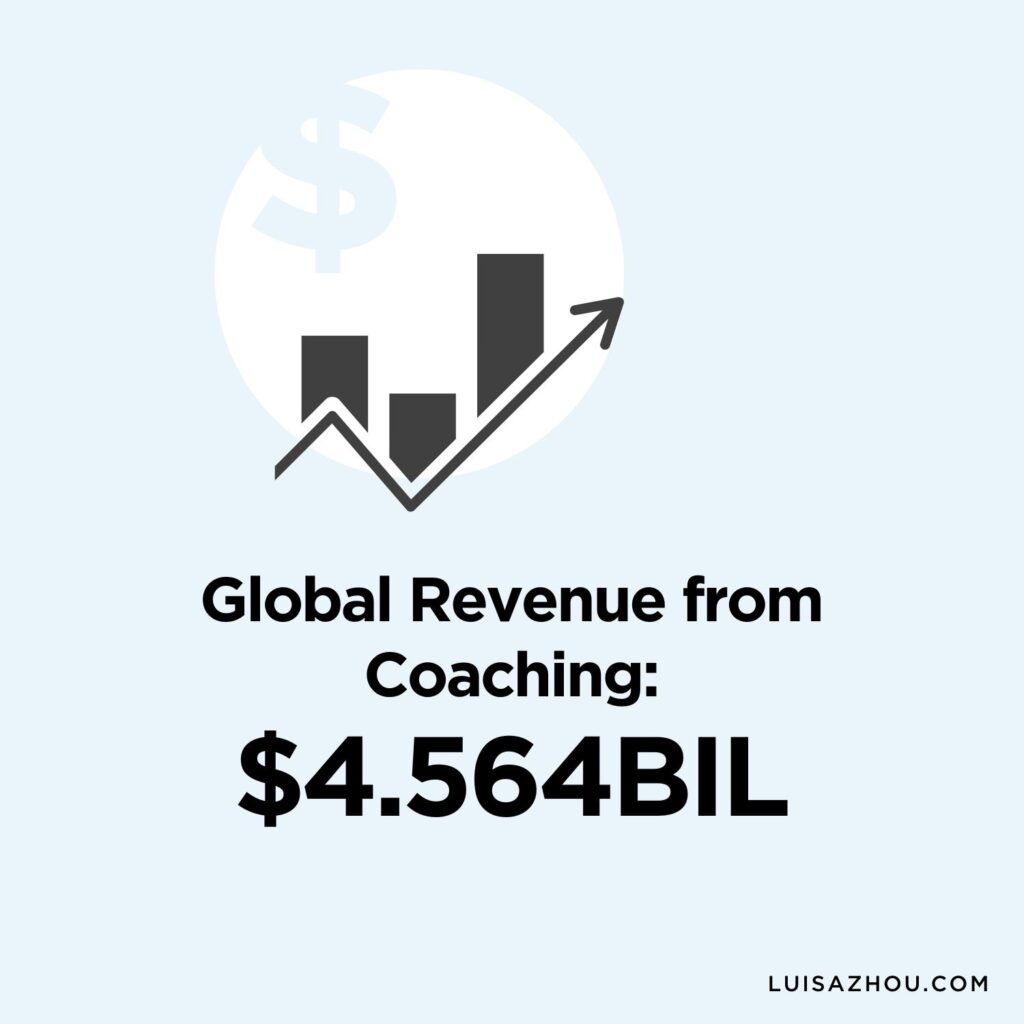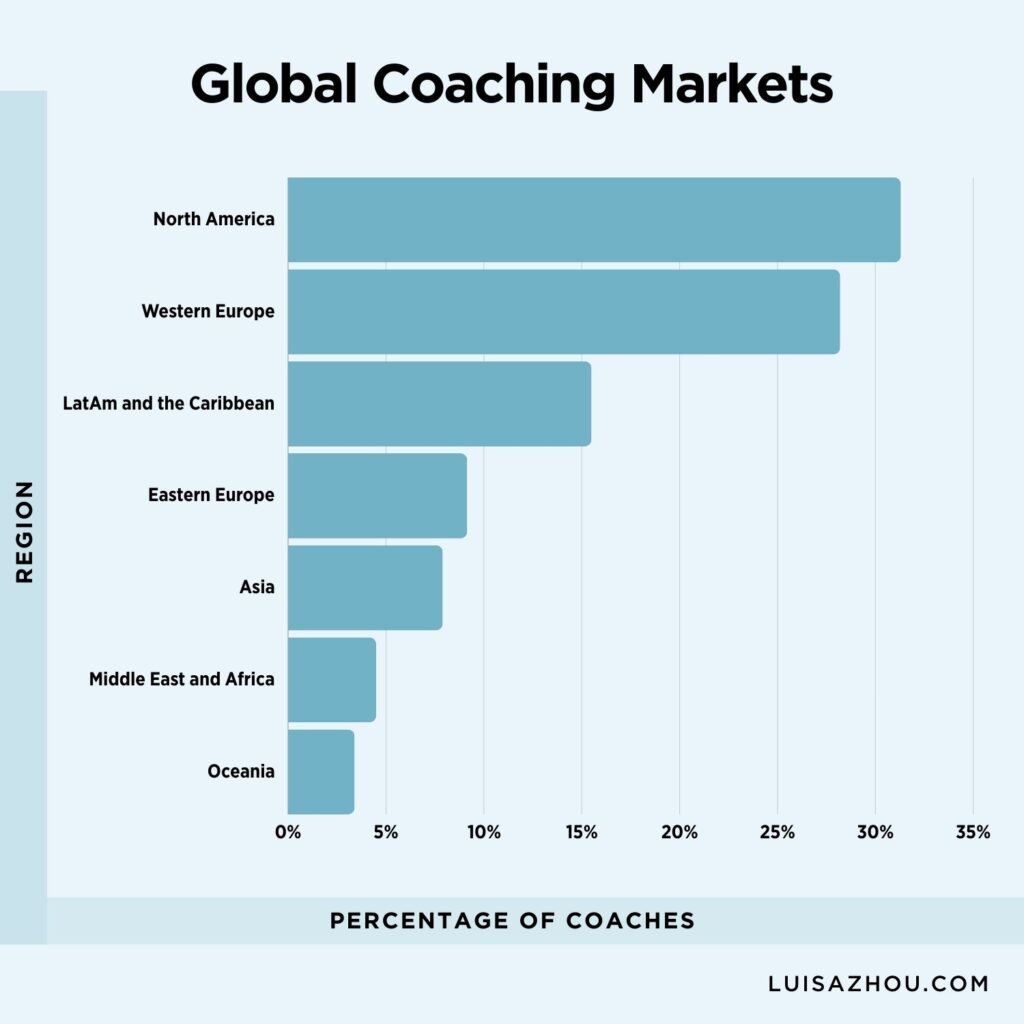What is the coaching industry market size in 2024?
Here, you’ll learn exactly how:
- Big the coaching market is
- Industry growth
- The number of coaches
- The main coaching trends
…And so much more.
Read on!
Overview of the coaching industry in 2024
- The coaching industry has grown 62% from 2019
- The coaching market generates $4.564 billion globally.
- The coaching industry market size is estimated to be a $20 billion industry
- There are 109,200 coaches worldwide, a 54% increase from 2019
- In North America, the coaching industry generates $2.08 billion
- In North America, this number of coaches is 34,200 with a 47% growth rate since 2019
- 99% of individuals and companies coached are satisfied or very satisfied
- Coaches charge an average hourly fee of $244
What is the coaching industry?
The global coaching industry is a billion dollar market with various niches. Essentially, coaches help others achieve their personal and/or professional goals.
Coaching is not to be confused with consulting, therapy, personal support, mentoring or training. In short, those methods improve situations whereas coaching improves people and empowers them to get the outcomes they desire.
What is the market size of coaching?
The coaching industry market size is estimated to have reached a value of $20 billion
(ICF Global Coaching)
PwC reports the coaching industry is the second-fastest growing sector in the world. By 2022, the coaching industry market size was expected to reach a value of $20B. Experts predict this will grow with an average yearly growth rate of 6.7%. This trend is proven since in 2019, the coaching market size was estimated at $15B. About half, $7.5B, of that market value was within the United States.
The global revenue of coaching is $4.564 billion
(ICF Global Coaching)
The most recent revenue estimate for the global coaching industry was in 2023 at $4.564 billion.
In 2019, the revenue was at $2.849B. This figure revealed a 21% increase in revenue since the 2015 estimate four years prior.

The industry is expected to reach $6.2 billion by 2024.

Is the coaching industry market growing in 2024?
(ICF Global Coaching)
The coaching market has grown 62% since 2019
The coaching market generated 62% more in 2022 compared to 2019 (from $2.9 billion to $4.564 billion), a 17% CAGR.

The main reason the industry grew so much was the increase in coaches (55% since 2019).
How many coaches are there?
There is an estimated 109,200 certified coach practitioners worldwide
(ICF Global Coaching)
In 2022, there were 109,200 certified coach practitioners worldwide. In 2019, that same figure was 71,000. That’s a 54% increase. Between 2015-2019, the increase was 33%.
An estimated 91% of coaches are actively practicing.
The majority of coaches are female with 72% of coaches being women in 2022 (up from 70% in 2019).
How much do coaches charge?
On average, coaches charge $244per hour
(ICF Global Coaching)
Coaches make an average hourly fee of $244, which is a 9% increase from 2019. Coaches spent an average of 11.9 hours per week coaching in 2022, which is 2% lower than in 2019. And they had 12.2 clients – a 4% increase from 2019.
What are the biggest coaching markets?
(ICF Global Coaching)
The biggest coaching markets are North America (34,200 coaches) and Western Europe (30,800 coaches).

How big is the coaching market in the United States?
In North America, the coaching industry generates $2.08 billion
(ICF Global Coaching)
The annual average income from coaching is $67,800 and 93% of 34,200 coaches are actively practicing.
The U.S. coaching industry is growing at a 5.4% annual pace
(Market Research)
The U.S. personal coaching market is forecast to grow at a 5.4% average annual pace. By 2022, it was estimated to be worth $1.38 billion. This figure also accounted for the brief recession and pandemic slowdown.
The U.S. coaching industry grew 30% in 5 years
(Market Research)
In 2011, the coaching industry of the United States rose from $707 million to $955 million by 2015. It continued to exceed $1.02 billion by 2016. This jump to a billion dollar industry proved a 30% increase in a span of just 5 years.
One third of coaches worldwide operate in North America
(ICF Global Coaching)
This worldwide survey revealed that 31.3% of coach practitioners operate their coaching services within North America. The rate of coaches in Western Europe is almost the same at 28.2%.
The annual spending on coaching in the U.S. is roughly $1 billion
(Harvard Business Review)
The United States, and many other countries, is heavily tracking the success of coaching. The annual spend is roughly $1B, but it’s hard to measure “the true success of coaching, [because we] assess the value with qualitative data.” Regardless, “the growing popularity of executive coaching is a response to compelling needs.”
How big is the online coaching market?
Online coaching platforms are projected to be worth $4.5 billion by 2028
(Verified Market Research)
In 2020, the market size of online coaching platforms was nearly $2 billion. By 2028, this market size is projected to increase to $4.5 billion. This is based on a CAGR of an impressive 13.03% from the forecast period of 2021 to 2028.
North America makes up the largest market share of online coaching
(Verified Market Research)
A global analysis comparing the online coaching platform market found that North America accounted for the largest market share in 2020, compared to Europe, Asia Pacific and the Rest of the World. The North American online coaching market is growing at 11.92% during the forecast period of 2021 to 2028.
Schools and universities make up the largest segment of the online coaching market
(Verified Market Research)
Who is using online coaching platforms the most? It turns out schools and universities accounted for the largest market share in 2020. This educational segment is projected to grow at a CAGR of 12.01% during the forecast period of 2021 to 2018. Other notable segments were Corporate Enterprises and Business Meetings and Professional Training Institutes.
Life coaching market size
The life coach industry is worth $1.4 billion
(IBIS World)
The market size of the life coach industry, measured by revenue, sits at $1.4 billion this year. The growth rate of this industry expects an increase of just 0.1% this year, although it’s grown more in the past.
The life coach market in the U.S. is growing 3.2% per year
(IBIS World)
The market size of the life coach industry in the United States is growing year over year. During the forecast period of 2017 to 2022, the industry grew 3.2% per year on average.
There are approximately 22,758 life coach businesses in the U.S.
(IBIS World)
Like many of the coaching markets, the life coach industry is growing. In the United States alone, there are almost 23,000 life coach businesses. The life coach market has an employment count of an estimated 23,361.
Executive coaching market size
The global executive coaching market is valued at $9.3 billion
(Future Market Insights)
Last year in 2021, the global executive coaching certification market was worth $8.4 billion. In 2022, the industry grew almost $1 billion, rising to a valuation of $9.3 billion.
The overall executive coaching certification market will be worth $27 billion by 2032
(Future Market Insights)
The demand of executive coaching is growing. Between the forecast period of 2022 to 2032, the executive coaching certification market is predicted to grow at a CAGR of 11.3%. This high rate will make the market surpass a valuation of $27 billion in the next ten years.
One-third of all Fortune 500 companies utilize executive coaching
(IPEC Coaching Institute)
Executive coaching is impacting one-third of all Fortune 500 companies as part of standard leadership development. This coaching is not just for elite executives, but also utilized by other employees. Why? For every $1 invested, companies reported an average ROI of $7.90 thanks to executive coaching.
Career coaching market size
The career coaching market is valued at $15.4 billion
(IBIS World)
This market size is worth an estimated $15.4 billion and expected to increase 4.7% this year. The job training and career counseling market size is ranked 475th in the United States.
The career coaching market is growing an average of 0.6% per year
(IBIS World)
Between the forecast period of 2017 and 2022, the career coaching market is expected to grow an average of 0.6% per year. This sounds like a small percentage, but when applying it to the $15.4 billion market size, that’s an increase of $9.2 million year over year.
Sales coaching market size
The sales coaching software industry is valued over $47.6 billion
(Future Market Insights)
To improve sales performance of individuals, many are turning to sales coaching software. This market is now worth over $47.6 billion and is expected to nearly double to $88.7 billion by 2032.
The sales coaching software industry has a growth rate of 8.4%
(Future Market Insights)
From 2021 to 2022, the sales coaching software industry documented a significant year-over-year growth rate of 8.4%. The forecast period of 2022 to 2032 predicts the sales coaching industry to have a CAGR of 6.4% during the ten year stretch.
The global product-based sales training market size is growing by $1.66 billion by 2025
(Future Market Insights)
Product-based sales training is a booming global market. From 2020 to 2025, it’s expected to grow by $1.66 billion and accelerate at a CAGR of 5.41% during the forecast period. This product-based coaching market is dominated by the APAC region, making up 36% of the market.
Sales coaching creates a 962% return on investment
(Janek Performance Group)
According to the post-training performance results from a global sales coaching firm, sales coaching measured an outstanding 962% return on investment. This ROI was backed by a 14.46% improvement in performance overall and a satisfaction rate of 96.22%.
Business coaching market size
The business coaching industry within the U.S. is worth over $14.2B (and it’s growing)
(IBIS World)
The United States is an epicenter in the global coaching market. The business sector of this industry is worth over $14B and is expected to grow 2.6%. Over the past five years, the business coaching industry within the U.S. has grown an average of 2.8% between 2017 and 2022.
65% of practitioners identified “business coaching” as their main area
(IBIS World)
Business coaching specifically makes up the majority of professional coaching. In 2019, 65% identified the main specialty of their coaching was regarding leadership, executive, business, organization, or small business. This percentage has risen from 62% in 2016 to the most recent study of 65% in 2019.
30% identified “leadership” as the main specialty of their business coaching
(IBIS World)
Almost one third of business coaches, 30%, are focused on coaching leadership specifically. This percentage has risen in recent years. In 2015, just one quarter of coaches, 25%, focused on leadership.
There are 60,472 business coaching businesses in the U.S. right now
(IBIS World)
There are over 60,000 businesses in the United States that specialize in business coaching. During the period of 2017 to 2022, business coaching in the United States was expected to grow 2.7%. The annualized business growth is an estimated 2.2%.
43% of people participated in business coaching to optimize work performance
(IPEC Coaching Institute)
Why do people seek business coaching? A survey found that almost half, 43%, of those who sought out professional business coaching did so to improve individual or team work performance. Another 39% wanted to improve communication skills while 38% hoped that business coaching would increase productivity.
Health coaching market size
The global health coach market size was $14.48 billion in 2021
(Precedence Research)
Last year, the health coach market nearly hit $14.5B. By 2030, this market size is estimated to reach over $25.95B. This is based on a CAGR of 6.7% from the forecasted period of 2022 to 2030.
The corporate wellness market is projected to be worth $84.5 billion by 2027
(Primal Health Coach Institute)
There is a lot of money in the global health and wellness market—$4.2 trillion to be exact. Companies are investing in health wellness programs for their employees, expanding the corporate wellness market value to reach $84.5 billion in the next 5 years.
There are an estimated 109,000 health coaches worldwide
(Precedence Research)
A global survey estimates there are just over 100,000 health coaches globally. The health coach market is the largest in the United States. This is likely due to the unhealthy lifestyle patterns of Americans and an increasing number of patients with chronic diseases and obesity.
What skills do professional coaches teach?
36% of women sought coaching to increase self-esteem
(IPEC Coaching Institute)
Women and men seek professional coaching for different reasons. While 36% of women found coaches to increase self esteem and confidence, just 33% of men had the same reasons. However, men were more likely at 33% to find a coach to improve business management strategies, while only 30% of women claimed that motivation.
55% of coaching cases are “change-oriented”
(The Manchester Review)
Professional coaching is meant to improve and develop persons, so over half of the industry is dedicated to making a “change.” Another 29% is growth-oriented, for example accelerating the learning curve for high-potential executives. Meanwhile, 16% is dedicated to combining both change and growth.
80% of people who received coaching increased self-confidence
(Institute of Coaching)
Coaching is designed to improve people, leading 80% to report an increase in self-confidence. Over 70% improved their work performance, relationships and communication skills.
Coaching increases productivity an average of 86%
(IPEC Coaching Institute)
When employee training is combined with coaching, the average individual increases their productivity by an average of 86%. This is nearly four times the rate of just training alone. The average increase of productivity from training is just 22%.
35% of coaching is spent enhancing interpersonal skills
(The Manchester Review)
What skills does business coaching teach you? A survey asked stakeholders to identify their top two developed areas from coaching. Results showed 14% enhanced leadership skills, 18% enhanced management skills, and 12% fostered personal growth (like career issues, work-life balance, and self-awareness). Lastly, 15% enhanced business agility improving technical/functional credibility.
Other important coaching market statistics
Many coaches are P.h.D. or M.B.A. graduates with 20+ years of experience
(The Manchester Review)
Who are these coaches? Coach practitioners are highly skilled professionals. All professional coach practitioners graduate from a standardized training program from a multitude of internally recognized institutes. The average coach is a P.h.D or M.B.A graduate and has at least two decades of work experience prior to becoming a coach.
86% of companies recouped their investment on coaching
(Institute of Coaching)
Almost 9 in 10 companies reported that they made the money back they invested in coaching. On average, the ROI of coaching was 600%. They also said their investment in coaching had many other benefits too, not just monetary gain.
Up to 70% of organizational change efforts fail due to lack of coaching
(Ace Up)
A reported 60% to 70% of organizational change initiatives fail. Why? They do not properly coach stakeholders “through the behavioral and mindset changes needed for them to succeed.” Studies show that leaders who were coached have 35% more positive interactions with others in the workplace than leaders who are not coached.
67% of Gen X leaders want more external coaching
(Lorman)
Almost 70% of business leaders from Gen X (those born in 1965 to 1980) report wanting more external coaching. Another 57% said they want external development.
88% of people who received coaching felt that it affected their feelings about their company
(Ace Up)
Coaching doesn’t just improve an individual overall and their performance, but it changes their perspective about the company they’re working for. 88% of people felt that coaching affected their feelings about working at their company.
One-third of U.S. workers think their company’s provided training doesn’t meet their expectations
(Lorman)
Hiring external professional coaches is a way to fill this gap of dissatisfaction in a company’s provided training. One in 3 employees say their company’s training is out of day while 91% want their training to be personalized and relevant.
Almost three-quarters of business leaders think “building new skills” is the most critical part of rebuilding businesses
(Ace Up)
The COVID-19 pandemic wreaked havoc on many industries and companies forcing them to rebuild their business. 74% of these business leaders think that “building new skills is the most critical part of rebuilding organizations post COVID-19.” What skills need to be coached most? Leadership and management (57%) emerged as the number-one in-demand skill.
90% of companies think managers should act as informal coaches
(Ace Up)
Hiring professional coaches is a smart business strategy, however, coaching should be implemented in the workplace via managers. At least this is true for 90% of organizations. Nine in 10 companies think managers are expected to act as informal coaches and steer employees in the right direction.
83% of people think it’s important that a coach has a certification
(IPEC Coaching Institute)
When people look for a coach, they want those who are certified. 83% of people in a survey who have worked with a coach said it was either “important” or “very important” that their coach had a coaching certification or credential. Even those who never worked with a coach had a similar outlook, as 76% had the same response.
56% of people aware of professional coaching have never participated in it
(IPEC Coaching Institute)
Many people have heard of professional coaching, but only 44% of those aware had worked with a coach before. Meanwhile, 41% reported they would not consider participating in a coaching relationship. Why? 43% said “coaching is not important” at the time while 26% said they could not afford coaching. Another 26% simply said they do not need coaching.
Popularity of coaching
66% of people are somewhat aware of coaching
(iPEC Coaching Institute)
The majority of people in a survey, 66%, were very or somewhat aware of the field of professional business and/or life coaching. Only one-third of respondents, 34%, had no awareness of the coaching market.
99% of coachees are “satisfied” or “very satisfied”
(iPEC Coaching Institute)
Research shows that professional coaching provides a significant return on investment (ROI). According to IPEC, a global coaching institute, 99% of those coached were “satisfied or very satisfied” and 96% said “they’d repeat the process.”
The biggest coaching trends in 2024
What coaching trends are driving the growth of the coaching industry?
Some of the most important trends are:

Growth in online coaching
Online coaching is growing – fast. And as coaching becomes more accessible, the industry will grow, too.
For example, clients don’t have to limit themselves to local coaches anymore.
Instead, they can work with the coaches who best fit their needs.
Access to AI
Artificial intelligence will help coaches improve their coaching.
For example, AI can be used as customer service chatbots or to help clients find the best solution from them.
AI coaching platforms will also boost growth in the coaching industry.
Increased demand for personal and professional development
The personal development industry is estimated to grow at a CAGR of 5.5% between 2023 and 2032. At the same time, more businesses are investing in their talent and helping them develop professionally.
Coaching ties into both. Coaches help people reach their personal goals or grow professionally.
Growth of the wellbeing industry
“Mental health coach” is in the top 4 search queries for health coaching. At the same time, the wellness market is growing 5-10% per year.
This is a coaching niche that will continue to grow in the next few years.
Diversified coaching niches
Coaching niches are getting more diversified than ever as the number of coaches and coachees grows.
Clients want coaching that’s tailored to their specific wants and needs.
For example, relationship coaching sub-niches include coaching people on dating apps, coaching divorcees, and so on.
Adoption of data-driven coaching
Coaches have access to more tools that offer data on their clients’ progress. And as they do so, client results improve – boosting the coaching industry.
Conclusion
There you have it! Now you know all about the coaching market size and other top coaching statistics from 2024.
The coaching industry is growing…fast.
And the rate it’s growing at is most likely not going to slow down in the next few years.
Read more:
How to Start a Coaching Business
Sources:








